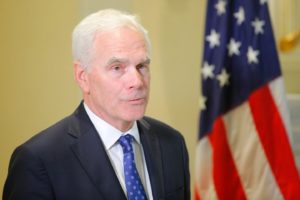New report outlines advantages of Oklahoma’s universal education tax credit program
Oklahoma is taking education freedom to a new level by reimagining universal school choice as a tax credit, and a new report explains the advantages.
The Oklahoma Parental Choice Tax Credit…

Oklahoma is taking education freedom to a new level by reimagining universal school choice as a tax credit, and a new report explains the advantages.
The Oklahoma Parental Choice Tax Credit program offers private and homeschool parents a refundable tax credit. Private schoolers can receive between $5,000 and $7,000, while homeschoolers can get up to $1,000.
Based on this year’s allocated funding, up to 25,000 families could receive sizable education tax credits.
Education experts at yes. every kid. published a report Thursday explaining the advantages tax credits have over education savings accounts (ESAs) or other types of scholarship programs.
The benefits include:
- High levels of autonomy for families;
- Using pre-existing tax mechanisms;
- Fewer legal hurdles;
- Potential for states to save money if tax credits are less than per-pupil public funding;
- And built-in accountability via tax audits.
“We believe that in a perfect world families would have multiple options to choose from,” Lily Landry, senior legislative analyst for yes. every kid., told The Lion. “Some may want to take their dollars through an ESA program knowing they have a platform they can log into to use towards eligible expenses. Some may want to receive a credit and take their money straight into a microschool or co-op and not be regulated in choosing their child’s learning environment.”
The report explains that states could also customize tax credits programs by prorating the credit based on the family’s tax bracket or giving partial credit to students enrolled in public school part-time.
A recent survey by yes. every kid. found strong support among all Americans for ESAs and tax credits, regardless of race, income level, or political affiliation.
“Americans believe more education options will improve our nation’s education system,” said Matt Frendewey, vice president of yes. every kid. “By expanding opportunities for families to customize the education to meet their kids’ needs, we can improve education more broadly.”
“We should not be trying to regulate families,” Landry added. “They know better than the government what will support their children’s learning.”
While Oklahoma didn’t invent education tax credits, it is the first state to make them universal. Other states, such as Illinois and Minnesota, have much smaller credits – often $1,000 or less.
Gov. Kevin Stitt signed the Parental Choice Tax Credit into law in May.
“Today is a historic day for the state of Oklahoma, and a huge win for students and parents all across the state,” Stitt said in a press release. “I am so proud that we were able to empower parents and deliver education freedom, so that every student has the opportunity to attend a school that best fits their needs, regardless of their background, economic status or zip code.”
The Oklahoma Tax Commission approved emergency rules in October allowing the tax credit to go into effect at the start of 2024. Families can apply for the credit as early as Dec. 1.



